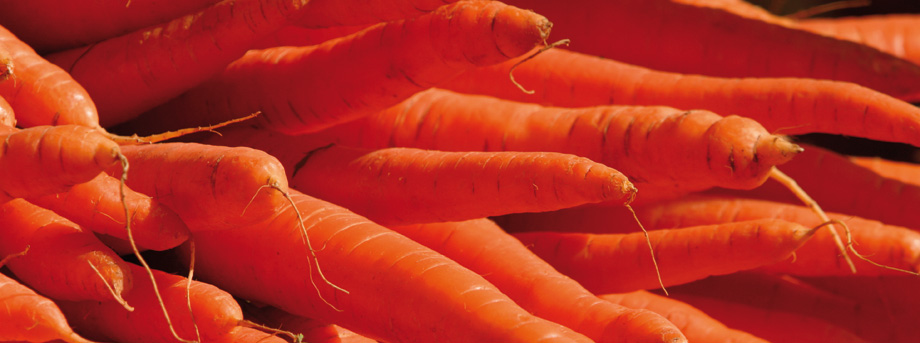Spotlight
February 4th, 2011
Let them eat carrots
New research suggests eating vegetables gives you a tan. The study, led by Dr Ian Stephen from the School of Psychology, University of Nottingham, Malaysia Campus, showed that eating a diet rich in fruit and veg gives you a more healthy glow than the sun.
Dr Stephen led the research as part of his PhD at the University of St Andrews and Bristol University. He and his team in the Perception Lab found that people who eat more fruit and veg have a more golden skin colour, thanks to carotenoids. Carotenoids — responsible for the red colouring in fruit and veg — are antioxidants that help soak up damaging compounds produced by the stresses of life. He said: “We found that, given the choice between skin colour caused by suntan and skin colour caused by carotenoids, people preferred the carotenoid skin colour.” While this study describes work in Caucasian faces, the paper also describes a study that suggests the effect may exist cross culturally, since similar preferences for skin yellowness were found in an African population.
Autistic children’s skills might not transfer
Scientific studies have shown that children with autism repeatedly outperform typically-developing children on visual search skills. Researchers have now shown that this skill doesn’t necessarily translate into real life situations. Using tests devised by Dr Alastair Smith from The University of Nottingham and carried out in a purpose-built laboratory, psychologists from the University’s Institute of Education, and the universities of Bangor and Bristol created tasks that required children to search large-scale space and learn about its properties — a skill that is critical to achieving independence in adulthood and underlie everyday behaviours such as searching for a bunch of keys. The study, which involved 40 school-age and ability-matched children, 20 of whom had autism, revealed that when faced with large-scale search tasks the children’s exceptional visual search skills did not translate to more everyday search behaviour.
Tackling China’s ‘sinking cities’ problem
A University researcher has been awarded funding to help China prevent human disaster as some of its fastest-growing cities sink under the weight of towering skyscrapers. Dr Andrew Sowter, a mathematician and scientist at The University of Nottingham Ningbo, China (UNNC), is developing a computer programme that will help Chinese authorities to accurately identify where, and by how much, structures are moving. The National Natural Science Foundation of China — affiliated to China’s highest governing body, the State Council — has granted funding of about ¥500,000 (about £50,000; US$75,000; €60,000) for research that will use Shanghai as a case study. The results of the research will include dramatically improved geological data for Shanghai and software technology developments that can be applied to other cities. Shanghai, one of the most densely-populated cities in the world and built on marshy ground, is believed to be sinking at an average rate of between 2cm to 4cm a year, putting pressure on underground pedestrian and railway tunnels and building foundations.
Commuters: Practise good hand hygiene
You’re six times more likely to end up at the doctors with an acute respiratory infection (ARI) if you’ve recently used a bus or tram — but those who use buses or trams daily might be somewhat protected compared with more occasional users.
Jonathan Van Tam, Professor of Health Protection in the School of Community Health Science and Director of the Health Protection Research Group, said: “This is a small exploratory study whose findings require confirmation by a larger study. However, the findings justify the need to practise good respiratory and hand hygiene when using public transport during periods when winter viruses are circulating and where possible to avoid situations where you might spread your germs to others when you have a respiratory illness.”
The research was funded by the Health Protection Agency.
Tags: autism, Director of the Health Protection Research Group, Dr Alastair Smith, Dr Andrew Sowter, Dr Ian Stephen, he University of Nottingham Ningbo, Health Protection Agency, Institute of Education, Jonathan Van Tam, Malaysia Campus, National Natural Science Foundation of China, Perception Lab, School of Community Health Science, School of Psychology, Shanghai, sinking cities, UNNC
Leave a Reply
Other News

Need news? See you on SharePoint
After 14 years of service, Campus News is being retired as the university’s staff news platform. […]

Roads and car parks closed for refurbishing work
As part of ongoing road improvements at the university, works will be taking place to resurface […]


